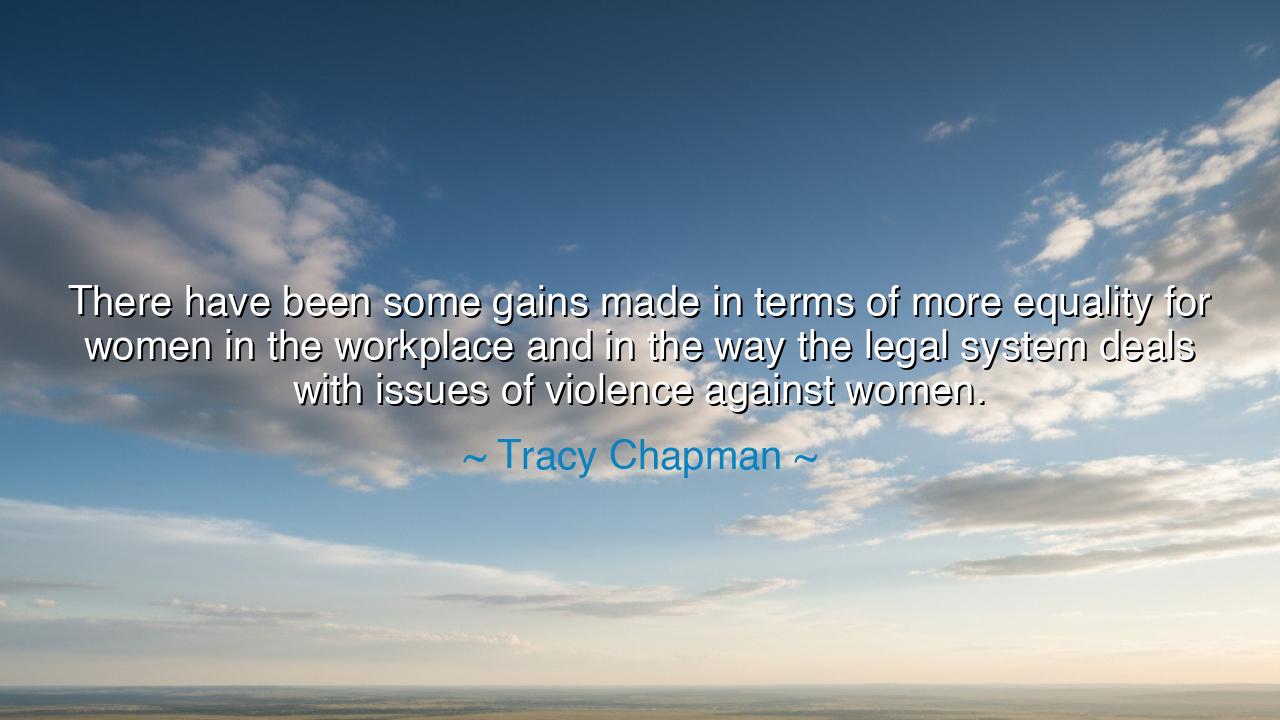
There have been some gains made in terms of more equality for
There have been some gains made in terms of more equality for women in the workplace and in the way the legal system deals with issues of violence against women.






In a voice calm yet steadfast, Tracy Chapman, singer of conscience and chronicler of truth, once said: “There have been some gains made in terms of more equality for women in the workplace and in the way the legal system deals with issues of violence against women.” Her words, though measured, carry the weight of centuries. They speak not of triumph completed, but of progress begun—a fragile dawn following a long and weary night. In them lies both gratitude for the strides taken and sorrow for the distance yet to go. For Chapman, whose songs often rise from the soil of human struggle, this is not mere observation; it is a quiet hymn of perseverance and hope.
The meaning of her words rests upon the dual pillars of justice and awakening. She acknowledges that equality for women—once but a distant dream—has begun to take tangible form. In the workplace, women have stepped forth from the shadows of servitude and silence into positions of influence, creation, and command. Likewise, in the courts of law, the cries that were once dismissed or unheard now find the echo of recognition. The systems of power, though still imperfect, have begun to see violence not as a private shame but as a public crime. Chapman's quote honors this transformation while reminding us that these “gains” are not gifts—they are victories wrested from centuries of resistance, sacrifice, and courage.
To grasp the origin of such a reflection, one must look upon history’s tapestry of pain and endurance. There was a time—not long past—when women’s labor was invisible and their suffering unspeakable. But each generation has carried the torch of change a little farther. From Sojourner Truth, who stood before men and declared, “Ain’t I a woman?”, to Emmeline Pankhurst, who marched for the vote and bore imprisonment for freedom’s sake, to the countless unnamed women who dared to speak truth in courts, in homes, and in streets—they are the roots of the progress Chapman speaks of. Their voices, often drowned in scorn, became the foundation of a new justice rising.
And yet, as the ancients knew, no victory is without its shadow. For progress, though real, remains uneven. In many places, the workplace still echoes with inequity—the silent expectation that women must prove twice their worth, earn half the wage, and carry burdens unseen. The legal system, though more aware, often moves slowly, weighed down by prejudice and power. What Chapman’s wisdom reveals is the tension between the ideal and the real—the truth that equality achieved in law must yet be realized in life. Her words do not ring with complacency but with watchfulness. She reminds us that the flame, once lit, must be tended, lest it flicker and fade.
There is a parallel here to the story of Rosa Parks, the quiet seamstress whose act of defiance lit the fire of the Civil Rights Movement. She did not see the full measure of justice in her lifetime, but she saw the beginning. Likewise, the women who fought for workplace rights and protection against violence may not witness the final equality they envisioned, yet their courage makes the way. Chapman’s quote, like Parks’s act, reminds us that progress is not a single revolution but a long pilgrimage, walked by many feet, generation after generation.
But her message is not of despair—it is of faith in the possible. To say that “there have been some gains” is to recognize that history can change, that structures built on injustice can be rebuilt on compassion. It is to trust that humanity, though slow, moves toward understanding. It is a call to gratitude for the progress made, and a charge to continue the work with humility and determination. For as long as violence exists, as long as inequality whispers in boardrooms and courtrooms, the work of justice remains unfinished.
Therefore, O listener, take this lesson into your heart: celebrate progress, but do not sleep within it. Honor those who fought for the ground beneath your feet by tilling it further. Speak where silence has been the enemy, act where fear has reigned, and protect those whose pain still goes unseen. Equality is not a monument to admire—it is a path to walk. If each person, man and woman alike, commits to fairness in word and deed, the day will come when such gains are no longer celebrated as victories, but lived as norms.
And when that day dawns, as Tracy Chapman foresees in her quiet wisdom, we shall look back upon this age and say: It was the turning point—the moment humanity began to see not men or women, but souls equal in worth, equal in dignity, and equal in right before the eyes of eternity.






AAdministratorAdministrator
Welcome, honored guests. Please leave a comment, we will respond soon